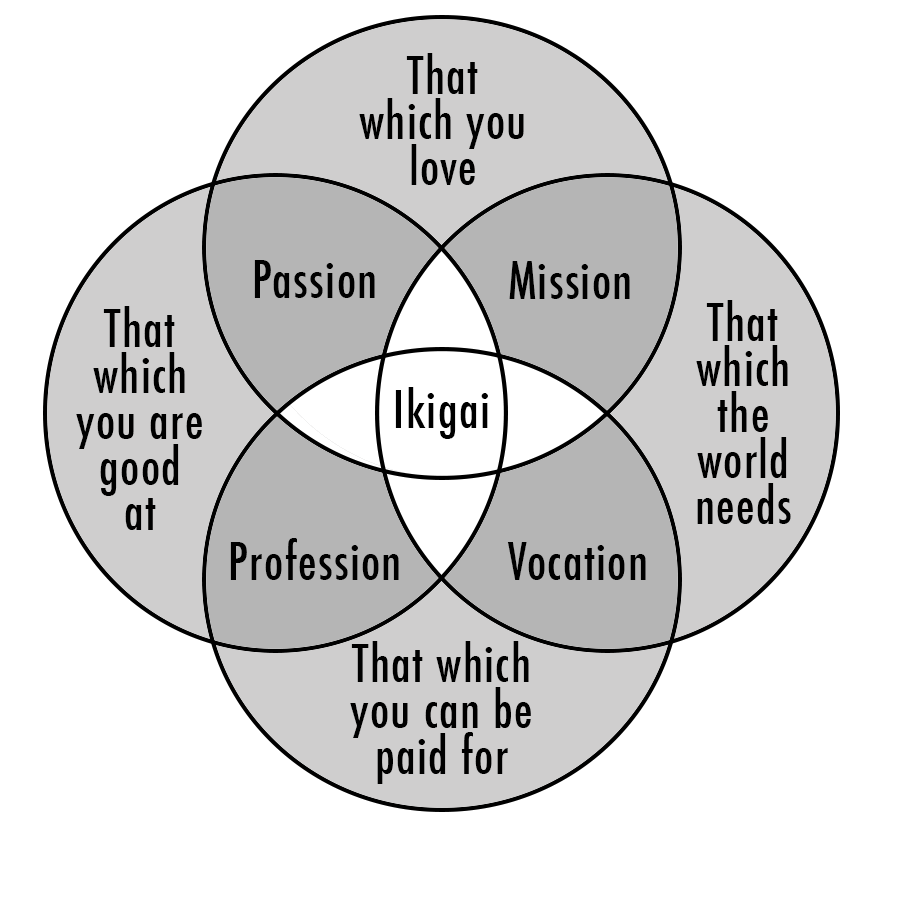Management
The most noble of professions
Ikigai is a Japanese concept that means "reason for being". It's a combination of the words "iki", meaning "life", and "gai", meaning "worth". Ikigai is similar to the French term "raison d'etre", which is the most important reason or purpose for someone or something's existence. Ikigai ties together in one concept the three essentials that Scottish author Alexander Chalmers says are necessary for happiness – something to do, someone to love, and something to hope for.
It is your defining personal meaning for your life in relation to your talents, passions, and profession, as well as what the world needs at a particular time. I like this image below created by Marc Winn in 2014, in an article titled What Is Your Ikigai? In it you see how your passion, mission, profession, and vocation all come together to form your Ikigai.
Many of us in the tech field are abstracted away from physical products or goods. We deal with bits and pixels, which can leave you wondering how your work has a lasting impact. I think this is why many people in tech have hobbies like music, woodworking, or pottery where they can get their hands dirty and touch their instruments or projects. If you are a manager, this abstraction is even further away from tangible goods. We coordinate and direct teams who then manipulate the abstractions to eventually help create, sell, move, or share some product or possibly even just an idea. It is easy to forget how your work is important. Thinking about this one day I came across Clayton Christensen’s book, How Will You Measure Your Life?
Christensen is a Harvard Business School Professor and author who developed the theory of disruptive innovation. In an HBR article summarizing the book, Christensen writes, “Management is the most noble of professions if it’s practiced well. [emphasis added] No other occupation offers as many ways to help others learn and grow, take responsibility and be recognized for achievement, and contribute to the success of a team.” As a manager, especially a manager in tech, you do have a huge impact on people’s lives in terms of their day-to-day job satisfaction as well as their careers. While leading and managing teams can be incredibly challenging, it is also possibly one of the most rewarding roles that one can have. Unfortunately this reward often takes months or even years but looking back on how your coaching, mentoring, or even just setting the example, helped someone else in their career is extremely rewarding. When you work with an employee on improving certain behaviors or skills and then get to witness their success through a promotion or other interesting opportunity, that is extremely rewarding. As their manager you should take great pride in how you helped.
But, what makes management such an important and noble profession? Here we are talking about management and not leadership which I differentiate using John Kotter’s straightforward distinction, “Management is about coping with complexity. Leadership is about coping with change.” Complexity comes in many forms including not only the complexity of breaking large projects down into smaller understandable tasks but also how to navigate a career ladder in terms of analyzing one’s skills against the desired standards. Complexity comes in managing relationships with peers, solving conflicts, and the dynamics amongst team members. These demonstrations of helping team members navigate complexity is the essence of management.
Management can be viewed as a craft that goes beyond merely overseeing tasks and people. It's about nurturing potential, guiding careers, and building environments where creativity and innovation flourish. This nurturing aspect is one way in which management is elevated to a noble profession. By investing in their team's growth and development, managers play a pivotal role in shaping not only the future of their team members but also the direction of the organization. They are the architects of a team's culture and morale, creating a space where each member feels valued and motivated. We often focus on leadership, and while that is important, this aspect of management is fundamental in creating a successful and sustainable organization.
Effective management is about striking a balance between meeting organizational goals and ensuring employee well-being. A noble manager understands that their team's mental and physical health is paramount and that a happy team is a productive one. They advocate for their team's needs, provide support during challenging times, and celebrate their successes. This empathetic approach is what differentiates a good manager from a great one. It demonstrates a commitment to the holistic well-being of their team, which in turn fosters loyalty, trust, and a positive work environment.
In addition, the global reach of management cannot be understated. Managers today are not just influencing their immediate teams but are part of a global network of professionals shaping industries and economies. With this global perspective, a manager's role becomes even more significant. They must navigate cultural differences, manage diverse teams, and foster an inclusive environment where all voices are heard and respected. This global dimension adds a layer of complexity to management but also presents an opportunity to make a broader impact on the world stage.
Management is far more than a job title or a set of responsibilities. It's a noble profession that requires a blend of skill, empathy, and vision in order to help teams navigate and cope with complexity. Managers have the unique opportunity to make a meaningful difference in the lives of their team members and, by extension, the broader world. Their influence shapes the future of businesses, industries, and perhaps most importantly, people. If you are a manager, I hope you hold your head high and are proud of the impact that you are making in the world and that you feel you have found your Ikigai.



